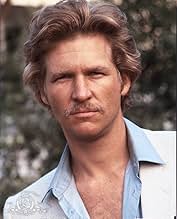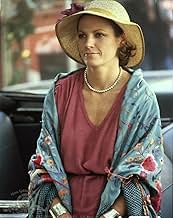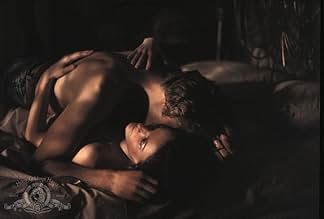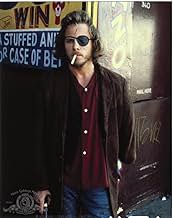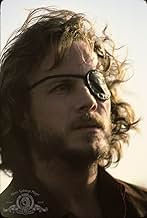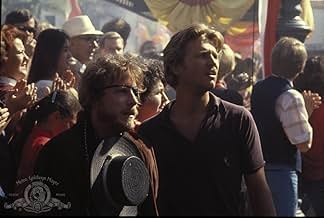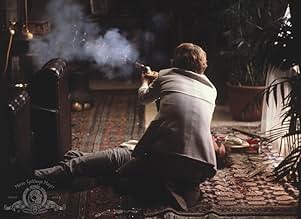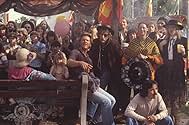AVALIAÇÃO DA IMDb
6,8/10
8,3 mil
SUA AVALIAÇÃO
Richard vê um homem descarregando um corpo e decide expor o homem que ele pensa ser o culpado com seu amigo Alex Cutter.Richard vê um homem descarregando um corpo e decide expor o homem que ele pensa ser o culpado com seu amigo Alex Cutter.Richard vê um homem descarregando um corpo e decide expor o homem que ele pensa ser o culpado com seu amigo Alex Cutter.
- Direção
- Roteiristas
- Artistas
- Prêmios
- 2 vitórias e 2 indicações no total
Francis X. McCarthy
- Toyota Man
- (as Frank McCarthy)
- Direção
- Roteiristas
- Elenco e equipe completos
- Produção, bilheteria e muito mais no IMDbPro
Avaliações em destaque
John Heard has got back from the war (it's not clearly said, but it's obvious it's Vietnam) with a patch on his eye and minus a leg and a hand. He's p-i-s-s-e-d off on the whole world, drinks a lot, and so does his wife. Jeff Bridges is a friend of both of them. He is a witness to a murder right in the beginning of the movie (so pay attention). John, with the deceased girl's sister thinks he knows how to nail who he thinks did it. Jeff doesn't really want to take part in it, you really don't want to see this movie. NOTHING happens. And they try to add a complication near the end, involving a history of a guy we hardly know... I'm sure it's a bad adaptation from the book, I hope so.
A friend of mine gave me the novel Cutter and Bone (AKA Cutter's Way) was based on, so that immediately creates a problem, comparing two different art forms.
Forget the novel (by the obscure Newton Thornburg) for this purpose only. The movie is a moving meditation on power, desperation, and paranoia. It is also a great love story.
I always end up writing "...you've read the other comments so you know what this is about" but Cutter and Bone is so many things, it cannot be pinned down easily.
As noted in the favorable reviews here, this is chock full of great film acting that moves the story along as well as making come alive. Who was the clueless shmoe who said "nothing happens"? What movie was he watching?
Adrift in post-Vietnam America, Cutter finally finds something in life that has meaning; the murder of a young hitchhiker.
But any meaning is too much for the damaged Cutter who becomes relentless in the pursuit of a possible killer who also is of the wealthy, powerful elite that sent OPS (other people's sons) to Vietnam. Cutter finally has a genuine target ("he's not anyone Rich, he's RESPONSIBLE" says Cutter to Richard Bone in a great line delivery by John Heard) for his unfocused righteous anger.
Bone tries to sabotage the investigation but ends up buying in at the very end. Why? He has the rage also, as did many Americans who weren't politically active, did not serve in Vietnam. It's a rage that infected a nation with guilt, self-doubt, and eventually, a new hubris, a kind of "never again" attitude toward "less developed" nations that has us yet again on the brink of yet another war in a series of wars that seem to never end and we hardly even notice anymore (remember Grenada? Bombing Tripoli and Benghazi? proxy armies in Nicaragua and El Salvador, etc.?)
The other part of Cutter and Bone is a love triangle and a very well explicated one at that. Cutter and Bone both love Mo who can't love herself. Bone is not as shallow as he appears and it scares him. Cutter is too damaged and angry to love her enough until she is gone.
I've known these people in one way or another, and that is why this movie has always meant so much to me. It is also about a great country I used to live in that began to disappear about the time this movie is set, and has since metamorphosed into a large wounded, angry monster, bereft of the tears for near-paradise lost that this excellent movie depicts.
Forget the novel (by the obscure Newton Thornburg) for this purpose only. The movie is a moving meditation on power, desperation, and paranoia. It is also a great love story.
I always end up writing "...you've read the other comments so you know what this is about" but Cutter and Bone is so many things, it cannot be pinned down easily.
As noted in the favorable reviews here, this is chock full of great film acting that moves the story along as well as making come alive. Who was the clueless shmoe who said "nothing happens"? What movie was he watching?
Adrift in post-Vietnam America, Cutter finally finds something in life that has meaning; the murder of a young hitchhiker.
But any meaning is too much for the damaged Cutter who becomes relentless in the pursuit of a possible killer who also is of the wealthy, powerful elite that sent OPS (other people's sons) to Vietnam. Cutter finally has a genuine target ("he's not anyone Rich, he's RESPONSIBLE" says Cutter to Richard Bone in a great line delivery by John Heard) for his unfocused righteous anger.
Bone tries to sabotage the investigation but ends up buying in at the very end. Why? He has the rage also, as did many Americans who weren't politically active, did not serve in Vietnam. It's a rage that infected a nation with guilt, self-doubt, and eventually, a new hubris, a kind of "never again" attitude toward "less developed" nations that has us yet again on the brink of yet another war in a series of wars that seem to never end and we hardly even notice anymore (remember Grenada? Bombing Tripoli and Benghazi? proxy armies in Nicaragua and El Salvador, etc.?)
The other part of Cutter and Bone is a love triangle and a very well explicated one at that. Cutter and Bone both love Mo who can't love herself. Bone is not as shallow as he appears and it scares him. Cutter is too damaged and angry to love her enough until she is gone.
I've known these people in one way or another, and that is why this movie has always meant so much to me. It is also about a great country I used to live in that began to disappear about the time this movie is set, and has since metamorphosed into a large wounded, angry monster, bereft of the tears for near-paradise lost that this excellent movie depicts.
The title "Cutter's Way" is a reference to the main character, Alexander Cutter, perhaps cinema's all-time best antihero. John Heard plays the difficult role of an angry Vietnam veteran who returned from what he now regards as a meaningless war minus an arm, an eye, and a leg. He hates the fat cats-feeling that they conned him and others into patriotically serving while they stayed home, and he resents his best friend Richard Bone (Jeff Bridges) who avoided the war and continues to avoid any involvement or commitment. Commitment is Alexander Cutter's one remaining virtue, when he sets his sights on taking down an arrogant oil tycoon who has gotten away with murdering a 17 year old cheerleader, he stubbornly refuses to give up this mission and insists on doing it his way.
Heard should have gotten the Best Actor Oscar in 1981 (it went to Henry Fonda for "On Golden Pond") but "Cutter's Way" was not popular with critics and viewers so Heard was not even nominated. It is an amazing performance as Heard must win audience sympathy for a character who is not only unpleasant, but terribly abusive to everyone- especially his wife and his only two remaining friends. But he earns our admiration with his final act as a knight (on a white horse) who gallops into danger to avenge his wife's murder.
With this Cutter is finally revealed as a romantic who is willing to back up his angry words and seemingly empty threats. His anger is over more than his wasted wartime sacrifice. He feels frustration and confusion because while he has remained the same, the world has changed around him in ways antithetical to his beliefs (can you identify with that?). He recognizes that he has become irrelevant to this world but is not going out until he has made a last stand. His commitment ultimately gets Bone to take his first moral stand and finish what his friend started, doing it "Cutter's Way".
Like "Fat City" (another of Jeff Bridges' early films) "Cutter's Way" is more appreciated now than at the time of its release. In part this is because both of these films have held up very well, if anything their political messages are even more relevant today. Thematically "Cutter's Way" is a political film-both anti-war and anti-power; very much in the tradition of "Chinatown" and the world of Raymond Chandler adaptations.
This film is essentially a character study with an expressionistic ending. Most action/adventure fans will find it way too slow and cerebral for their tastes. The acting and the themes are its strength, the contrived story is a non-fatal flaw. The multi-dimensionality of Cutter, Bone, and Cutter's wife Mo (an extraordinary performance by Lisa Eichhorn) are carefully crafted and revealed by director Ivan Passer. Cutter's other remaining friend George (Arthur Rosenberg) is equally well crafted but more secondary to the story.
A fifth character (the dead cheerleader's older sister played by Ann Dusenberry) appears to be a victim of the post-production process as she simply disappears without explanation about 20 minutes before the film's end. Normally the absence of a supporting character would go unnoticed but Dusenberry had done such a nice job developing this character (maximizing what little she was given to work with) that the absence is glaring. Contemporary audiences will see a lot of Dominique Swain in Dusenberry. They not only look enough alike to be sisters but they have the same confident flare to their acting style. Passer had to work hard to keep Dusenberry reined in but succeeded in getting a nice restrained performance from her, her high intensity peeks through just enough to convey that there is more to her character than meets the eye.
Then again, what do I know? I'm only a child.
Heard should have gotten the Best Actor Oscar in 1981 (it went to Henry Fonda for "On Golden Pond") but "Cutter's Way" was not popular with critics and viewers so Heard was not even nominated. It is an amazing performance as Heard must win audience sympathy for a character who is not only unpleasant, but terribly abusive to everyone- especially his wife and his only two remaining friends. But he earns our admiration with his final act as a knight (on a white horse) who gallops into danger to avenge his wife's murder.
With this Cutter is finally revealed as a romantic who is willing to back up his angry words and seemingly empty threats. His anger is over more than his wasted wartime sacrifice. He feels frustration and confusion because while he has remained the same, the world has changed around him in ways antithetical to his beliefs (can you identify with that?). He recognizes that he has become irrelevant to this world but is not going out until he has made a last stand. His commitment ultimately gets Bone to take his first moral stand and finish what his friend started, doing it "Cutter's Way".
Like "Fat City" (another of Jeff Bridges' early films) "Cutter's Way" is more appreciated now than at the time of its release. In part this is because both of these films have held up very well, if anything their political messages are even more relevant today. Thematically "Cutter's Way" is a political film-both anti-war and anti-power; very much in the tradition of "Chinatown" and the world of Raymond Chandler adaptations.
This film is essentially a character study with an expressionistic ending. Most action/adventure fans will find it way too slow and cerebral for their tastes. The acting and the themes are its strength, the contrived story is a non-fatal flaw. The multi-dimensionality of Cutter, Bone, and Cutter's wife Mo (an extraordinary performance by Lisa Eichhorn) are carefully crafted and revealed by director Ivan Passer. Cutter's other remaining friend George (Arthur Rosenberg) is equally well crafted but more secondary to the story.
A fifth character (the dead cheerleader's older sister played by Ann Dusenberry) appears to be a victim of the post-production process as she simply disappears without explanation about 20 minutes before the film's end. Normally the absence of a supporting character would go unnoticed but Dusenberry had done such a nice job developing this character (maximizing what little she was given to work with) that the absence is glaring. Contemporary audiences will see a lot of Dominique Swain in Dusenberry. They not only look enough alike to be sisters but they have the same confident flare to their acting style. Passer had to work hard to keep Dusenberry reined in but succeeded in getting a nice restrained performance from her, her high intensity peeks through just enough to convey that there is more to her character than meets the eye.
Then again, what do I know? I'm only a child.
Ostensibly this film appears to be a buddy movie from the 1980s, but it is actually something much more interesting. Employing standard Hollywood clinches with its thriller/ investigation narrative and many of of its "stock" characters and situations, the little guys - Heard and Bridges - take on Mr Fat Cat Capitalist who rules the peacetime world like an untouchable and corrupt monarch. The film, though well-executed and enjoyable, at first seems no more than a well-scripted, well-acted (Heard is particularly good as the embittered, crippled Vietnam Veteran) genre piece. However, what emerges by the end is something far more exciting and radical - an indictment of US politics and power relations, and a genuinely bleak reflection on the impossibility and rarity of real justice both at the micro and macro levels.
Vietnam and its true significance is used to great effect in the film, as is the interplay between the two buddies. Whilst Bridges won't accept that he has witnessed the ultimate, bleak truth of US power relations until the film's abrupt, punchy end, Heard knows the truth intuitively and automatically because he understands and hates the world from the the start. He has given up on notions such as forgiveness and even the need for legal process, and seeks only revenge on the rich and the powerful. He understands, correctly, that is the only way a kind of momentary justice is possible, since everything else is either controlled by the elites or made to protect them. Without wishing to spoil the film's brilliant final moments, it is here that the whodunnit story is stripped away and the guilt they have been seeking to prove, as Richard Bone realises, becomes entirely political or metaphysical, and the the crime itself becomes irrelevant.
Vietnam and its true significance is used to great effect in the film, as is the interplay between the two buddies. Whilst Bridges won't accept that he has witnessed the ultimate, bleak truth of US power relations until the film's abrupt, punchy end, Heard knows the truth intuitively and automatically because he understands and hates the world from the the start. He has given up on notions such as forgiveness and even the need for legal process, and seeks only revenge on the rich and the powerful. He understands, correctly, that is the only way a kind of momentary justice is possible, since everything else is either controlled by the elites or made to protect them. Without wishing to spoil the film's brilliant final moments, it is here that the whodunnit story is stripped away and the guilt they have been seeking to prove, as Richard Bone realises, becomes entirely political or metaphysical, and the the crime itself becomes irrelevant.
Cutter's Way is one of my most favorite films. The characterization is excellent, the plot is both persuasive and surprising, and the acting is flawless--Lisa Eichhorn, whom I'd never heard of before, in particular. It's a travesty that virtually no one has heard of this film; all I can say is that it is well worth watching, if you can find it at your video store or watch it on late-night TV....
Você sabia?
- CuriosidadesBefore production started on this film, Ivan Passer and producer Paul R. Gurian went to Jeff Bridges' house to ask him if he would agree to play Bone. After both entered Bridges' property, the actor's dog, a big German shepherd, attacked Gurian, biting him on the jaw. Gurian nearly died. Bridges later confessed that, after this incident, he had no choice but to accept the role in order to avoid being sued for several million dollars.
- Erros de gravaçãoValerie's disappearance is neither explained nor noted by the main characters.
- Citações
Alex Cutter: I don't drink. You know, the routine grind drives me to drink. Tragedy, I take straight.
Principais escolhas
Faça login para avaliar e ver a lista de recomendações personalizadas
- How long is Cutter's Way?Fornecido pela Alexa
Detalhes
- Data de lançamento
- País de origem
- Idiomas
- Também conhecido como
- Obstinação
- Locações de filme
- 800 Alvarado Place, Santa Barbara, Califórnia, EUA(El Encanto Hotel scenes.)
- Empresa de produção
- Consulte mais créditos da empresa na IMDbPro
Bilheteria
- Orçamento
- US$ 3.000.000 (estimativa)
- Faturamento bruto nos EUA e Canadá
- US$ 1.729.274
- Faturamento bruto mundial
- US$ 1.752.634
Contribua para esta página
Sugerir uma alteração ou adicionar conteúdo ausente

Principal brecha
By what name was Caso de Assassinato (1981) officially released in India in English?
Responda

